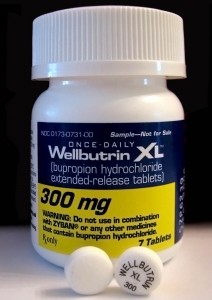 Wellbutrin SR is selective inhibitors of reverse neuronal uptake of catecholamines (noradrenaline and dopamine) with minimal effect on indolamine inhibition (serotonin) and lack of MAO.
Wellbutrin SR is selective inhibitors of reverse neuronal uptake of catecholamines (noradrenaline and dopamine) with minimal effect on indolamine inhibition (serotonin) and lack of MAO.
After oral administration, maximum plasma concentration is reached after 3 hours. The drug hydroxy metabolite moderately are bound to plasma proteins (84 and 77%, respectively). This medication is extensively metabolized in the body. Approximately 87% of bupropion (the main component of the drug) is excreted in urine (less than 10% – as active metabolites), and 10% – through feces. In unaltered state, only 0.5% of bupropion is displayed. Wellbutrin average clearance is about 200 l / h, and half-life is about 20 hr.
This medication is applied to depression treatment and depressive episodes relapse prevention.
Dosage and administration
It is prescribed for the initial treatment of patients aged 18 and older and is administered in one dose of 150 mg once a day. The full antidepressant effect usually develops within a few weeks after starting treatment. With lack of effectiveness, the dose may be increased to the maximum – 300 mg/day. The maximum single dose is 150 mg. Doses exceeding 150 mg/day should be divided into 2 doses at intervals of not less than 8 hours.
Supportive therapy after acute depressive episodes is carried out at least during 6 months.
Pronounced variability is given in bupropion pharmacokinetics in patients with slightly and moderately severe hepatic cirrhosis, the interval between doses should be increased.
In patients with severe liver cirrhosis, bupropion dose should not exceed 150 mg a day.
Contraindications
There are the following contraindications of Wellbutrin SR:
- hypersensitivity to bupropion;
- seizures in history;
- psychogenic bulimia or anorexia, including history;
- concomitant use of MAO inhibitors.
Side Effects
Here is the list of common side effects caused by Wellbutrin SR:
- fever;
- chest pain;
- asthenia;
- tachycardia;
- vasodilation;
- increased blood pressure (in some cases significantly);
- skin flushing;
- collapse;
- cramps;
- insomnia;
- tremor;
- impaired concentration;
- headache;
- dizziness;
- depression;
- confusion;
- hallucinations;
- agitation;
- anxiety;
- irritability;
- aggression;
- depersonalization;
- anorexia;
- weight loss;
- dry mouth;
- nausea;
- vomiting;
- abdominal pain;
- constipation;
- pruritus;
- rash;
- sweating;
- hypersensitivity reactions (urticaria, angioedema, dyspnea, bronchospasm, rarely – anaphylactic shock, arthralgia, myalgia, and fever);
rarely – erythema multiforme and Stevens-Johnson; - tinnitus;
- blurred vision and taste.
Special Instructions
When used in dosages which do not exceed the maximum recommended (150 mg, 2 times a day), the incidence of seizures is approximately 0.1% (1 in 1,000 cases). Likelihood of convulsions resulting from Wellbutrin use, is dose-dependent and correlates closely with risk factors presence: traumatic brain injury in history, central nervous system tumors, seizures in history, simultaneous drugs use that reduce seizure threshold, alcohol abuse, abrupt alcohol discontinuation or use of sedatives, diabetes mellitus, at which insulin or hypoglycemic agents are used for treatment, use of psychostimulant or anorectics.
Wellbutrin SR should be discontinued and not be re-assigned for patients who observed seizures and hypersensitivity reactions during treatment.
Bupropion should be used with caution in patients with liver diseases, increasing inter-dose intervals in patients with slight and moderately severe liver cirrhosis. With extreme caution, it is used in case of severe liver cirrhosis.
All patients with liver diseases should be evaluated for possible adverse effects (eg insomnia, dry mouth, seizures) that could indicate high levels of bupropion or its metabolites in blood.
Bupropion and its metabolites are excreted primarily by kidneys, so patients treated with renal impairment should be started with bupropion use in reduced doses. Patients should be monitored for possible side effects, indicating a high level of bupropion or its metabolites in serum.
Elderly patients often characterized by decreased renal function, it is recommended to reduce the dose of bupropion for their treatment.
As with other antidepressants, there is a risk that bupropion can activate manic phase in patients with manic-depressive psychosis in depressive diseases’ phase, as well as latent psychosis in other susceptible patients.
Safety of bupropion in pregnancy has not been established. Therefore, bupropion appointment during pregnancy is permissible only if the expected benefit to mother outweighs the potential future risk to the fetus.
As bupropion and its metabolites penetrate into breast milk, it is recommended to stop breastfeeding while taking bupropion.
Like other agents that affect the central nervous system, bupropion may reduce capacity for activities requiring increased attention and coordination.
Interaction
Bupropion is metabolized in main active metabolite — hydroxide bupropion mainly involving cytochrome P450 2B6 (CYP 2B6), so you need to be prescribed with care bupropion concurrently with drugs that affect isoenzyme CYP 2B6 (eg orphenadrine, cyclophosphamide, ifosfamide).
Bupropion and its hydroxide bupropion are inhibitors of isoenzyme CYP 2D6. In clinical studies, use of Wellbutrin sr increased level of desipramine in blood plasma. This effect was observed for at least 7 days after the last dose of bupropion was taken. Simultaneous administration of bupropion with drugs that are metabolized by isoenzyme CYP 2D6, to date has not been studied, so simultaneous use of drugs metabolized mainly by this isoenzyme (some blockers β-adrenergic receptors, antiarrhythmics, antipsychotics) should be taken with minimal doses. If bupropion is prescribed to patients who are already taking drugs metabolized by CYP 2D6, should assess the need to reduce the dose.
Co-administration of inducers of microsomal enzymes (carbamazepine, phenobarbital, phenytoin) or their inhibitors may alter the clinical activity of bupropion.
Limited clinical data suggest a higher incidence of neuropsychiatric side effects in patients receiving bupropion concurrently with levodopa or amantadine, so the appointment of such a combination should be careful.
Concomitant use of bupropion and transdermal nicotine can cause increased blood pressure.
Affordability
Wellbutrin SR, as it was mentioned above is applied for depression treatment and prevention so that this medication can become a way out from such a difficult state. Canadian Health and Care Mall is a universal way to order Wellbutrin online to restore your emotional state. Our online pharmacy ships drugs internationally that’s why place an order and get your parcel during 8-21 days. Moreover, our online pharmacy offers you 10-% discount.
Command our service where your shopping will be affordable and fascinating. We provide our customers with effective and high-quality medications directed to eliminate any diseases’ symptoms. Take a chance to make shopping and online ordering more favorable. Everything you need will be found in our assortment. A wide range of medications allows us to attract more and more customers worldwide.



